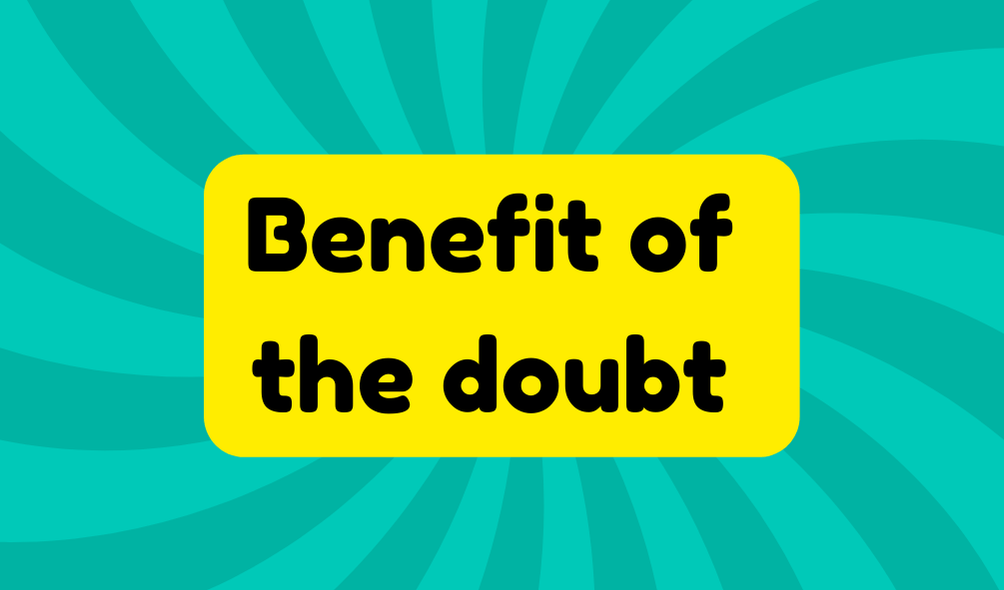The phrase "the benefit of the doubt" implies trusting someone's integrity despite uncertainty. It highlights a willingness to believe in good intentions and truthfulness. Historically, this principle emerged from legal contexts, including the Irish treason trials in 1798. Commonly used today, it emphasizes the importance of fostering trust, especially in personal and professional relationships. Understanding its meaning, usage, and background can enhance communication skills and promote healthier interactions. More insights on this concept await exploration.
Synonyms
In discussions surrounding the phrase "benefit of the doubt," several synonyms emerge that capture its essence. These expressions relate closely to the concept of conceptual trust, bridging personal relationships and legal implications. Understanding these synonyms is essential for a nuanced perspective on trust and judgment.
- Presumption of innocence
- Trusting good intentions
- Assumption of honesty
- Conditional acceptance of claims
Each term reflects an inclination to accept a person's integrity, fostering collaboration and reducing conflict. However, one must remain aware of potential pitfalls in relying too heavily on these interpretations, particularly when faced with complex social or legal contexts.
Example of Sentences
The use of the phrase "benefit of the doubt" often creates a complex interplay between trust and skepticism in various situations. It addresses everyday misunderstandings and often appears in examples in literature. Here are some illustrative sentences to reflect upon:
- "She assured him of her honesty, and he decided to give her the benefit of the doubt."
- "Despite the rumors, he believed in his friend's integrity and gave him the benefit of the doubt."
- "In the debate, the audience awarded the speaker the benefit of the doubt, despite mixed opinions."
- "Whether in negotiations or friendships, granting the benefit of the doubt fosters trust amidst uncertainty."
Origin
Language often evolves in mysterious ways, and the origin of the phrase "benefit of the doubt" showcases this complexity. Its historical significance lies in its legal implications, rooted in the principle of assuming innocence until proven guilty. Documented usage traces back to the Irish treason trials in 1798. Significantly, variations of the phrase likely existed during the Boston Massacre Trials of 1770, although written evidence is sparse.
| Time Period | Event |
|---|---|
| 1770 | Boston Massacre Trials |
| 1798 | Irish Treason Trials |
| Late 1800s | Current phrasing recorded |
Collocations
Collocations related to the phrase "benefit of the doubt" reveal intricate relationships between words and their usage in everyday contexts. Understanding these pairings can enhance one's grasp of nuances in communication. Key collocations include:
- "give someone the benefit of the doubt"
- "extend the benefit of doubt"
- "deserve the benefit of the doubt"
- "withhold the benefit of the doubt"
Examining these collocations within their usage context uncovers deeper meanings and potential misinterpretations. While promoting trust and open-mindedness, one must remain aware that extending this benefit could lead to misjudgments, making critical thinking essential for balanced evaluations in various situations.
How to Use in Everyday Language
Trust, an essential element in human interactions, often hinges on the idea of giving someone the benefit of the doubt. This phrase embodies the practice of using doubt constructively, allowing for a pause before forming judgment. By interpreting innocence in others, individuals uphold an environment of fairness. For instance, in workplace discussions, colleagues can challenge suspicions while simultaneously choosing to trust intentions. Such actions foster collaboration and open communication. However, caution remains crucial; blind trust can lead to misinterpretations. Balancing skepticism with an open mind helps create a thoughtful approach, ensuring trust thrives without disregarding the potential of deception.
Why Is It Still Relevant Today?
In today's complex world, the concept of giving the benefit of the doubt remains vital for fostering healthy relationships and productive interactions. As trust dynamics evolve, adopting this mindset encourages cooperation and understanding. In environments rife with skepticism, whether in personal or professional spheres, providing a foundation of trust can mitigate conflict. Moreover, the legal implications of the phrase emphasize its importance in maintaining fairness and justice. By acknowledging uncertainty while operating under the assumption of good intent, individuals can navigate challenges more effectively, leading to innovative solutions and stronger connections. Embracing this principle is essential for a collaborative future.







